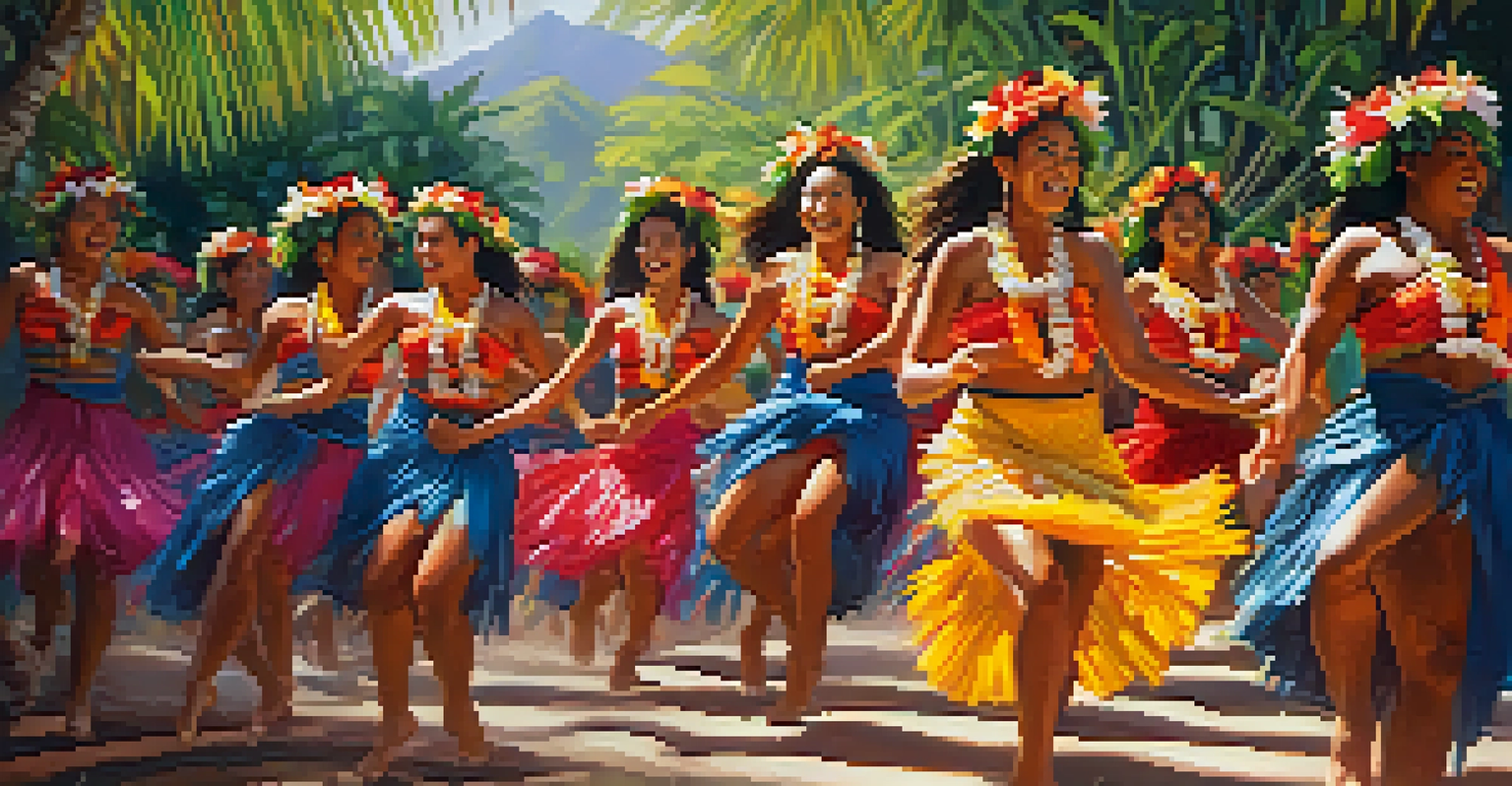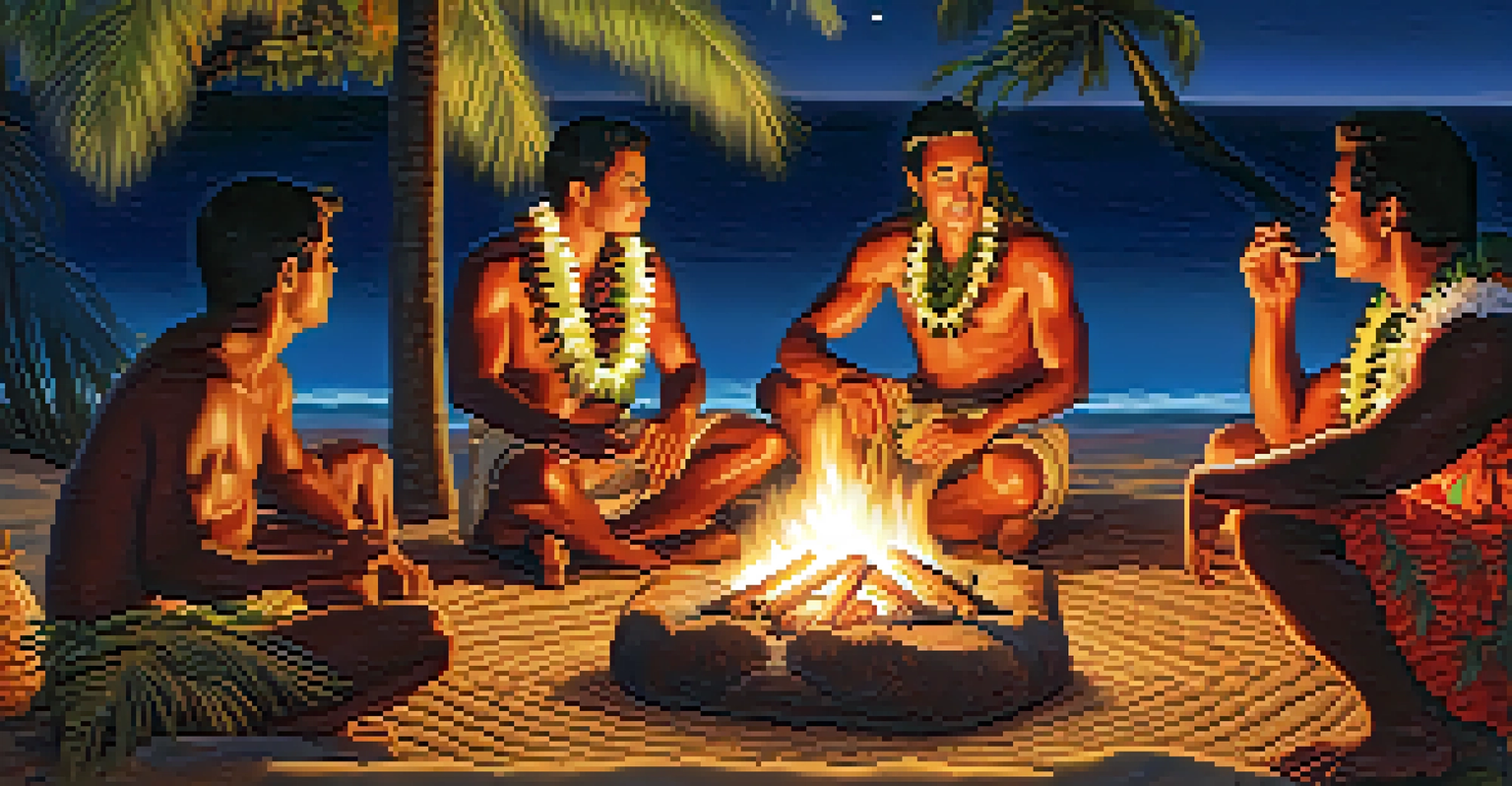Hawaiian Literature: Reflecting the Islands' Rich Cultural Heritage

Understanding Hawaiian Literature's Origins and Evolution
Hawaiian literature has deep roots that can be traced back to the oral traditions of the islands' indigenous people. Before the written word was introduced, stories were passed down through generations, often accompanied by chants and songs. These narratives served not only as entertainment but also as a means to share history, cultural values, and spiritual beliefs.
In Hawaiian culture, storytelling is a powerful way to convey history, culture, and values, weaving together the past and present.
With the arrival of European missionaries in the early 19th century, the Hawaiian language was first written down, marking a pivotal moment in the evolution of Hawaiian literature. The missionaries helped to create a written record of Hawaiian stories and folklore, allowing these tales to reach wider audiences. This transition from oral to written forms was crucial in preserving the unique cultural identity of the islands.
In the 20th century, Hawaiian literature began to flourish with the emergence of local authors who incorporated both traditional themes and contemporary issues. Writers like Maxine Hong Kingston and Lois-Ann Yamanaka have played significant roles in bringing Hawaiian stories to an international stage, showcasing the islands' rich tapestry of experiences.
The Role of Oral Traditions in Hawaiian Literature
Oral traditions are the lifeblood of Hawaiian literature, rich with genealogies, myths, and legends that connect the past with the present. These stories often highlight the significance of 'aina (land) and the deep relationship between the people and their environment. For instance, the tale of Pele, the goddess of volcanoes, embodies the fierce power of nature and the cultural reverence for the land.

As these stories were shared, they not only entertained but also educated younger generations about their heritage and responsibilities to the land and community. This oral storytelling tradition continues to be celebrated through hula, chants, and performances, ensuring that the essence of these narratives remains alive. It creates a dynamic storytelling experience that is both participatory and communal.
Roots in Oral Traditions
Hawaiian literature originates from rich oral traditions that preserve history, cultural values, and spiritual beliefs.
Moreover, as modern writers draw inspiration from these oral traditions, they often weave them into their works, blending the old with the new. This fusion not only honors the past but also addresses contemporary themes, enriching the literary landscape of Hawaii.
Key Themes in Hawaiian Literature: Identity and Place
One of the most prominent themes in Hawaiian literature is the exploration of identity, particularly in relation to place. The islands themselves are not just a backdrop but a character in their own right, shaping the lives and experiences of those who call them home. Writers often grapple with questions of belonging and the impact of colonialism on Hawaiian identity.
Language is the road map of a culture. It tells you where its people come from and where they are going.
For example, many local authors delve into the complexities of being Hawaiian in a modern world, navigating the tensions between traditional values and contemporary life. This theme resonates deeply in the works of writers like N. Scott Momaday and Kiana Davenport, who reflect on the struggles and triumphs of their people.
Additionally, the concept of 'ohana (family) plays a significant role in defining identity within Hawaiian literature. The bonds between individuals and their communities are often depicted as vital to understanding one’s place in the world, creating a rich tapestry of interconnected stories.
Contemporary Hawaiian Writers Making Waves
The landscape of Hawaiian literature is vibrant and diverse, thanks in large part to contemporary writers who are redefining narratives. Authors like Kiana Davenport and Chris McKinney are not only telling their stories but also addressing social issues such as race, identity, and environmental concerns. Their works resonate with both local and global audiences, bridging gaps and sparking conversations.
One notable figure is Lois-Ann Yamanaka, whose novels often reflect the struggles of Hawaiian youth, bringing forth voices that are sometimes marginalized. Her ability to portray the complexities of life in Hawaii has earned her recognition and respect within literary circles.
Contemporary Voices Reshaping Identity
Modern Hawaiian writers are addressing social issues and redefining narratives, reflecting the complexities of identity and place.
These contemporary writers are crucial in keeping the spirit of Hawaiian literature alive while pushing boundaries. They draw from their heritage and experiences to create stories that are not just about Hawaii but also about universal themes that resonate with readers everywhere.
The Importance of Cultural Preservation Through Literature
Literature serves as a powerful tool for cultural preservation, especially in a place like Hawaii, where history and identity are intricately linked. By documenting stories, traditions, and perspectives, writers help to ensure that the unique heritage of the islands is not lost over time. This preservation is vital for future generations to understand their roots and the challenges faced by their ancestors.
Additionally, as Hawaiian authors write about their culture, they create a sense of pride and belonging among the local community. This literature not only reflects personal experiences but also elevates the collective narrative of the Hawaiian people, fostering a deeper appreciation for their history.
Through the lens of literature, readers can explore the complexities of Hawaiian culture, from the challenges of colonialism to the resilience of its people. This understanding promotes respect and recognition for the islands' cultural richness, both locally and globally.
The Impact of Language on Hawaiian Literary Expression
Language is a vital component of Hawaiian literature, serving not only as a means of communication but also as a vehicle for cultural expression. The Hawaiian language, or 'Ōlelo Hawai'i, is infused with meaning and depth, often reflecting the values and worldview of its speakers. Writers who incorporate Hawaiian language into their works preserve its beauty while highlighting the significance of cultural identity.
In many contemporary pieces, you might find Hawaiian words interspersed with English, creating a unique linguistic blend that enriches the narrative. This practice not only honors the language but also invites readers to engage more deeply with the text, bridging cultural gaps and fostering understanding.
Cultural Preservation Through Writing
Literature plays a crucial role in preserving Hawaiian culture and heritage, fostering pride and understanding among future generations.
Moreover, the revitalization of the Hawaiian language has led to a resurgence of interest in Hawaiian literature. With more people learning 'Ōlelo Hawai'i, there's a growing appreciation for works that celebrate the language, further solidifying its place in the literary canon.
Hawaiian Literature's Global Influence and Recognition
Hawaiian literature has begun to capture international attention, showcasing the islands' rich cultural heritage to a broader audience. As local authors gain recognition in literary festivals and awards, their stories resonate beyond Hawaii, inviting readers from all walks of life to explore the islands' unique experiences. This global influence is a testament to the universal themes present in Hawaiian literature.
Moreover, the rise of digital platforms has allowed Hawaiian writers to share their work with an even wider audience. Social media, blogs, and online publishing have made it easier for authors to connect with readers across the globe, fostering a greater appreciation for Hawaiian narratives.

This global recognition not only uplifts the voices of Hawaiian authors but also encourages cross-cultural dialogue. By sharing their stories, these writers invite readers to reflect on their own identities and the complexities of their cultures, creating a beautiful tapestry of shared human experiences.